Polymers Petrochemicals Plastics Recycling 02-03-2019 - Arhive
Microplastic from plastic bags and food packaging form the most common waste in the ocean, scientists warned.
Polyethylene makes up over half the plastic (54.5%) found in the Mediterranean, according to new research.
It is followed by polypropylene (16.5%) – used in margarine tubs, for instance – and polyester (9.7%) that helps create clothing, furnishings and textiles.
More than 60 per cent of the debris swirling through the sea is plastic.
But they are not all the same.
They are made of different chemical building blocks and have different densities.
Both polyethylene and polypropylene are lighter than seawater.
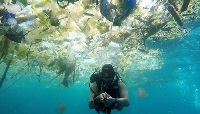
Dan K. Eberhart is CEO of Canary, an independent oilfield services company in the United States, and a frequent commentator on oil markets and US politics. The opinions expressed in this commentary are his own.
Congress has been debating the No Oil Producing and Exporting Cartels Act, or “NOPEC,” which would make international oil cartels illegal, exposing countries that coordinate on the price of oil to the risk of litigation in US courts.
The odds are pretty good that anti-OPEC (Organization of the Petroleum Exporting Countries) legislation could eventually win the approval of Congress, given rising anti-Russian and Saudi Arabia sentiment, including anger over President Trump’s response to the murder of journalist Jamal Khashoggi, and the subsequent resurgence of progressive Democrats in the House of Representatives.

UK-based supplier of flexible packaging products Now Plastics is planning to introduce its new line of films, made using 60% to 90% post-consumer recycled polyethylene terephthalate (PCR PET) resin, across European markets.
The European Union has approved the new films for use in food contact and other product applications
The company noted that the PCR PET films are suitable for the CPG industry and will allow converters and manufacturers across Europe to comply with new sustainability goals.
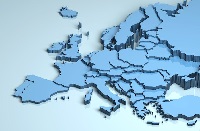
Haley Gershon is marketing specialist for Beta Analytic. Web: betalabservices.com
A growing interest in natural and eco-friendly products makes the role of eco-labels crucial in legitimising some of the claims made about packaging materials, says Haley Gershon
Many products claim to be composed of renewable materials, and within a competitive market there is potential for greenwashing here. This can create uncertainty and distrust among consumers as they consider their purchases.

Monforts will demonstrate a number of enhancements that have recently been made to its texCoat and Allround coating units at the forthcoming Techtextil show in Frankfurt from 14-17 May.
In a major development for the coating of technical textiles and nonwovens, Monforts is now offering the coating roller for its texCoat and Allround coating units as an optional carbon fibre version, in order to meet even the highest level of coating accuracy that is being demanded by the most exacting customers today.
“The carbon rollers provide the extreme stiffness necessary to deal with the winding tension required in the processing of materials such as prepregs for composites and other heavyweight fabrics, but at the same time, a significant improvement in coating accuracy is achieved, even for very lightweight flexible materials,” explained Jürgen Hanel, Monforts Head of Technical Textiles.
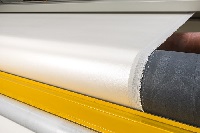
Reclaiming the value of plastic waste has been on the front burner for many companies recently, and several are on the path to commercializing their innovations, including Loop Industries Inc. and the folks at IBM’s laboratory with their VolCat process.
This week, researchers at the U.S. Department of Energy’s National Renewable Energy Laboratory (NREL; Golden, CO) announced their take on plastics upcycling—transforming discarded products into new, high-value materials of better quality and environmental value, with the goal of incentivizing recycling of waste plastics.
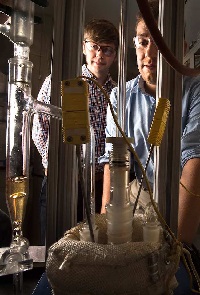
HFPA memo clarifies latest from the USTR, Congress
News on the tariff front is a mixed bag, according to the Home Fashion Products Association (HFPA).
On the up side, the US Trade Representative (USTR) is scheduled to publish a notice today in the Federal Register that makes President Trump’s previously announced delay in hiking List 3 duties effective “until further notice.”
List 3, which kicked in Sept. 24, 2018, imposed 10% duty on $16 billion in Chinese-made goods. The list included fibers, carpet and rugs, and feather & down products like feather boas, but not down & feather itself. Due to the delay, they will not rise to 25% tomorrow, according to a memo from HFPA legal counsel Robert Leo.
“There are reports that the President wants to sign a deal with China by the end of March. However, there are also reports that the difficult trade issues to be resolved are not close to agreement,” wrote Leo, a partner at Meeks, Sheppard, Leo & Pillsbury.
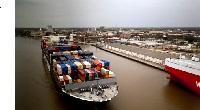
Resin, which uses sugarcane as a raw material and is 100% recyclable, will be used for the first time in line of garden sprayers
Braskem’s Green Plastic will be used in the manufacture of sprayers from Guarany, a producer of machines for the application of pesticides and agribusiness equipment. The resin, which uses sugarcane as a raw material, will be used in the products of the Katu line, which Guarany is launching to strengthen its portfolio of sustainable products.
The line, which features 5 L high-pressure sprayers, 1.2 L and 7.6 L pre-compression sprayers, and 10 L lever sprayers, in addition to the 500 ml Multisprayer and 350 ml Export models, made with the renewable resin, are already available on the market. The equipment is aimed at the gardening sector and will feature the I’m greenTM seal, identifying the products, as a differentiator.
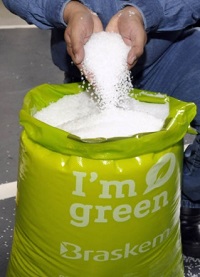
Packaging Materials Policy/Regulation Sustainability
US films supplier Now Plastics has launched a “groundbreaking” line of films, made from 60-90% post-consumer PET specifically for the European market.
The company is targeting Europe as the region takes on its stringent Plastics Strategy, which targets higher rates of recycling and a blanket ban on a number of single-use plastics.

